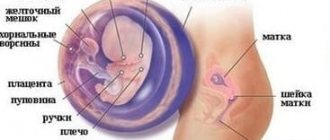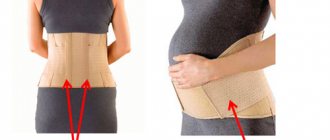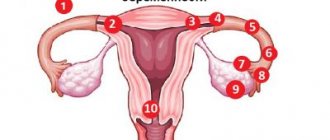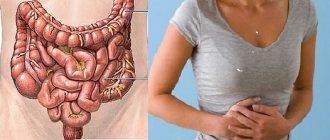With the onset of a long-awaited pregnancy, a woman notices a number of changes that appear at different stages. Only a doctor can talk about pathology or normality, but in any case, there are some points that are worth remembering and knowing in a timely manner. In particular, the most common type of abdominal pain is a pulling in the lower abdomen when walking during pregnancy. Is this feature normal physiology or should we sound the alarm?
Why does the lower abdomen hurt during late pregnancy?
Pain accompanies the pregnant woman throughout the third trimester.
They indicate preparation for childbirth. The period is accompanied by changes in hormonal levels. The hormone relaxin stimulates relaxation of the ligamentous apparatus of the pubic symphysis and pelvic bones. Training contractions can cause pain at 35-36 weeks; they pass quickly. Particular attention should be paid to frequent cramping attacks of a sharp nature, because this phenomenon indicates the risk of premature birth.
If they are too intense, persist for a long time and are accompanied by discharge, placental abruption may be suspected.
On the eve of the birth of a child, symptoms are associated with lowering of the fetal head and pressure on the pelvic bones.
What causes periodic pain in the lower abdomen during late pregnancy?
The greatest changes occur in the third trimester; progesterone is produced most intensively. It relaxes the smooth muscles of the uterus and organs located nearby.
This process leads to disruption of the digestive and genitourinary systems, complaints of bowel dysfunction in the form of constipation, belching, heartburn, and hiccups.
During this period, rapid growth of the fetus is observed, muscles and ligaments become overstrained. Even coughing or sneezing causes nagging pain.
Starting from the 37th week, the uterus becomes overly active, causing pain in the lumbar region and sides. Spasmodic contractions may be felt, indicating gradual dilatation of the cervix.
At 38 weeks, discomfort resembles menstruation. It can bother you until the very birth, the reason is that the child is in the position in which he will enter labor.
Chronic gastritis during pregnancy
If a woman is diagnosed with chronic gastritis (inflammation of the gastric mucosa) even before pregnancy, then it is quite possible that during an “interesting situation” it will worsen and manifest itself with greater force. When this happens, the woman feels discomfort in the upper abdomen. To avoid this, it is necessary to avoid eating very spicy or salty foods and overeating. Some medications (paracetamol, Nurofen), especially hormonal drugs, are also unsafe.
Swimming pool for treating abdominal pain
The pool has a positive effect on the health of a pregnant woman. Her body, succumbing to stress, becomes more resilient, which will make it easier to endure childbirth.
During water aerobics classes, special exercises are performed, their goal is to prepare the muscle fibers involved in childbirth. They allow you to better feel the environment in which the baby grows and develops, have a relaxing effect and reduce the intensity of pain.
Thanks to the exercises, the respiratory organs are prepared; when immersed under water, the baby becomes more resilient to oxygen starvation.
Water has a positive effect on the psycho-emotional state, helps to distract oneself, improves mood, and makes the body more resilient to pain. Visiting the pool has a positive effect on the immune system.
The standard lesson plan consists of:
- swimming;
- diving;
- water aerobics.
Pregnancy is an exciting and responsible period for the expectant mother. Even a minor pathological symptom should not be ignored.
Therefore, when it appears, it is recommended to consult a doctor. The woman will feel more confident, and it will be possible to prevent the development of complications that pose a threat to the woman and child.
What does dull, pulling, point or cutting pain in the abdomen indicate?
Stomach pain during pregnancy is due to changes in the body, in organs associated with hormonal changes, changes in the position of internal organs, and obstetric pathologies.
Many types of these sensations do not pose a threat to the health of the mother or the condition of the fetus. Others cause significant harm and even death to the woman and the unborn child.
Pain is a reaction of the nervous system to stimuli. A symptom of many diseases, including obstetric pathologies during pregnancy. A pregnant woman experiences hormonal changes and a restructuring of many systems. They are also accompanied by this feeling.
If discomfort and pain occur, it is better to consult with your doctor about the nature of these sensations and appropriate treatment. During pregnancy, a woman is responsible not only for her own health, but also for the health of the baby.
Nature has determined that the mother’s body tries to protect the fetus from all negative influences. A plug formed from mucus in the cervix prevents pathogenic microorganisms from entering.
Umbilical cord nutrition is formed in such a way that harmful chemical compounds do not enter the fetus. The uterus itself protects the child from external mechanical influence.
At the same time, during the period of bearing a baby, the woman herself may regularly experience pain of varying intensity and nature. Each type of discomfort indicates the presence of different pathological conditions, with the exception of harmless obstetric ones associated with changes in the maternal body and preparation for childbirth.
Based on the nature, intensity of pain, and gestational age, we can talk about how dangerous the condition is.
For example, pulling, extending to the lower back and groin, may indicate a risk of miscarriage. An additional sign of the condition will be the presence of bloody discharge.
In this case, you should immediately seek medical help and undergo an examination. If you delay visiting a doctor, the frequency of contractions will become more frequent and spontaneous miscarriage will occur.
Uterine tone is dangerous regardless of how early it was diagnosed. The fetus may experience a lack of oxygen and incoming nutrients. The woman feels a sharp pain like contractions. The solid state of the uterus and lower abdomen is recorded.
In case of injury, late toxicosis, or stress, placental abruption may occur. The condition is accompanied by acute pain in the lower abdomen. Often there is internal bleeding without external manifestations in the form of discharge. Urgent hospitalization and surgical intervention are required. Without help, death will occur.
Cramps accompanied by dizziness at five to twelve weeks can be a symptom of an ectopic pregnancy. For a number of reasons, the egg was unable to enter the uterus and became embedded in the fallopian tube.
As a result of the rapid growth rate of the fertilized egg, severe pain occurs. The woman is sent for an ultrasound examination. An operation to terminate the pregnancy is prescribed. Lack of medical care will result in death for the pregnant woman.
A number of non-gynecological problems also contribute to the occurrence of unpleasant sensations in the lower abdomen:
- Disruption of the gastrointestinal tract. Additional symptoms: bitterness in the mouth, tingling in the lower abdomen, heartburn.
- Inflammation of the bladder and urinary tract. Symptoms: discomfort and burning when urinating, increased frequency of the urge to urinate, increased body temperature.
- Seasonal colds. They are accompanied by headaches, nasopharyngeal congestion, aching bones, and fever.
- Inflammation of the appendix (appendicitis). An acute condition in which severe vomiting occurs, weakness, and a strong increase in temperature are detected. Surgery is used to remove the inflamed area. This procedure is safe for a pregnant woman. Abdominal laparotomy appendectomy is used if peritonitis is suspected and less invasive laparoscopy is used if there are no signs of peritonitis. A course of rehabilitation therapy is prescribed.
It is possible to diagnose the pathology based on additional symptoms. Treatment should be supervised by medical professionals. It is prohibited to take pharmaceutical drugs on your own. If you aggravate your own condition through inept actions, this will inevitably affect the child’s development.
Cholecystitis during pregnancy
This is the name for inflammation of the gallbladder, manifested by pain and a feeling of heaviness in the right hypochondrium. In this case, the pain can be either dull and aching, or sharp, cramping. In the first case they speak of chronic cholecystitis, in the second - of acute cholecystitis. Sometimes the pain is accompanied by a feeling of bitterness in the mouth, nausea, vomiting, belching, heartburn, and bloating. Typically, an attack begins after a diet violation (for example, when eating fatty or fried foods) or can be triggered by shaking while driving. This is especially fraught with the presence of gallstones.
When do you need to see a doctor urgently, and which doctor will help?
Cases of pain where medical intervention cannot be avoided:
- Cramping attacks of a pulling nature (especially in the first trimester of pregnancy) - you need to immediately seek help. There is a high risk of miscarriage or placental abruption. The presence of mucous discharge mixed with blood is a reason to call an ambulance for immediate hospitalization of the patient.
- Shingles with a return to the lower back in the presence of a burning sensation at the time of urination - signs of the development of pyelonephritis. Long-term treatment may be required. Signs of illness should be reported immediately.
- In the later stages, accompanied by contractions and increased uterine tone - a sign of premature birth.
Regardless of the stage of pregnancy, the appearance of bleeding from the vagina with or without pain - you should definitely call an ambulance.
Consulting a pregnant woman and caring for the patient during pregnancy is the responsibility of the local obstetrician-gynecologist. They work in district antenatal clinics.
You can get an appointment with them in the following ways:
- through an electronic appointment system;
- by calling the registration number of the medical institution;
- Some consultations retained the journal recording system.
If the pain is not associated with the course of pregnancy and does not affect the development of the fetus, then you need to contact your local physician. It is important that treatment is selected taking into account saving the life and health of the mother and child.
Useful video
To learn about why your stomach hurts during pregnancy and what to do in this situation, watch this video:
Similar articles
- Discharge during late pregnancy: what...
The intensity of the discharge increases in the later stages of pregnancy, and if it is clear and does not have an unpleasant odor, the woman has no reason to worry... Read more - Sedentary work during pregnancy and its consequences
Sedentary work during early pregnancy is not as fraught as a constant forced position in the last trimester. As the size of the abdomen increases, the load on the lumbar spine increases. Read more
- Hematoma in the uterus during pregnancy: causes, sizes...
And here is more information about blood pressure during late pregnancy. ... Therefore, it is important, even with minor nagging pain in the lower abdomen, to come for an examination and perform an ultrasound. Read more
- How to maintain pregnancy in the early stages...
nagging pain in the lower abdomen, lower back... The sooner the threat of early pregnancy termination is identified, the sooner the doctor will be able to provide help and save the fetus. Read more
Top medications to reduce abdominal pain during pregnancy and breastfeeding, painkillers
Painkillers are not advisable during pregnancy. Especially in the first months, when the main formation of organs and tissues of the future person occurs. However, the process of experiencing discomfort caused by constant negative factors also does not bode well.
Before purchasing analgesics, consultation with a specialist is required. It is advisable to try non-pharmaceutical ways to cope with discomfort.
The least dangerous drug is Paracetamol. Suitable for use throughout the entire gestation period. Toxic components are in minimal concentration and are quickly excreted in the urine.
Ibuprofen is a non-steroidal anti-inflammatory drug. Prescribed with caution during the second trimester. Contraindicated for the first and third trimester. Use may cause a number of dangerous side effects. If your condition changes slightly for the worse while taking an analgesic, you should inform your doctor.
Indomethacin also belongs to the group of non-steroidal anti-inflammatory drugs. It is subject to the same restrictions as Ibuprofen. If taken continuously, there is a risk of damage to the child's kidney function.
For the first two trimesters, it is permissible to use creams and ointments based on:
- Diclofenac.
- Ketoprofen.
- Ketorolac.
In the third trimester, you can only use local products based on herbal ingredients. It is forbidden to apply them if they contain bee or snake venom.
Ointments with an irritating effect that stimulate increased blood circulation can also have a negative effect. There is a risk of developing uterine tone and high blood pressure.
The most powerful painkillers are classified as narcotic substances and are prohibited for free sale. Their use occurs only in a hospital with extremely severe pain. These are drugs based on morphine and codeine.
The list of chemical compounds for pharmaceutical use during pregnancy is extremely limited. Before you start taking it, you should read the instructions for use in detail and strictly follow the manufacturer’s recommendations on dosage and method of use.
It is important to familiarize yourself with the provisions on common side effects and contraindications.
It is possible to use folk and non-traditional methods of getting rid of suffering. For example, yoga for pregnant women, acupuncture, light massage, aromatherapy. Traditional methods are also used. But their use also needs to be discussed with a specialist.
A pregnant woman has a stomach ache while walking
Have you found pain while walking? Don't worry. There are many reasons for the occurrence of such pain, but most of them do not pose a great threat to your unborn baby. Try to listen to our recommendations and then your pregnancy will go well.
- If you want to eliminate the pain, just lie down. Bend your legs at the joints, press them to your tummy. You can also take a warm bath.
- You can reduce pain or eliminate it altogether in this way: train yourself to walk correctly, try to move your shoulders back, shift your center of gravity from your toes to your heels.
- Wear a brace designed for pregnant women. This belt will allow you to reduce the load on the abdominal muscle tissue and relieve tension from the spine. Wear it starting from the second trimester. But don’t use it constantly – a maximum of 3 hours, then a break of half an hour, and you can put it on again.
- Walk more, do swimming, therapeutic exercises - all these physical activities will strengthen the abdominal muscles and make your back stronger. There is one prohibition - do not make very sudden movements, try not to lift heavy loads during pregnancy.
- Include foods that contain a lot of calcium in your diet. For example: milk, cheese, nuts, meat products, greens, eggs and so on.
If you find severe pain during movement or pain that occurs for no reason and only gets worse, consult a doctor immediately. Don’t wait, take care of your health and the health of your future little one.
Preventive measures to avoid abdominal pain
The basis of prevention is the correct lifestyle of a pregnant woman:
- No stress factors. The mental state of the mother is the key to the health of the child. The fetus inside a woman reacts sensitively to changes in the mother’s emotional background. He is not able to recognize the causes of depression or fears, but he is aware that adverse events are occurring. If the mother is very worried, there is a risk of pathological changes during the formation of the future person. Neurological and psychological problems are possible.
- Elimination of physical fatigue. Pregnant women are not recommended to attend training regularly. During active sports, blood pressure levels increase noticeably. This will provoke the development of uterine tone, which will inevitably lead to adverse consequences. You can go for walks in the fresh air.
- Properly designed diet and nutrition schedule. It must be balanced. You should not consume fast food products or preservatives; it is recommended to reduce the amount of tea and coffee. It should consist of vegetables, fruits, animal and plant protein. It is worth taking vitamins prescribed by a doctor for those who are pregnant. Weight control is required, since the percentage of subcutaneous fat outside the normal range negatively affects the functioning of the cardiovascular system and gastrointestinal tract. The feeding processes of the fetus are disrupted. With rapid weight gain, nutritional correction and a special diet may be prescribed. Excess weight contributes to decreased activity, bad mood, and additional pain in the back and joints. Make sure there is no overeating.
- Maintaining a sleep and rest schedule ensures that a woman is highly active. She does not feel tired and overwhelmed, which means she has a positive morale.
- Regular observation by an obstetrician-gynecologist according to the established schedule, passing mandatory tests, compliance with received medical recommendations. Undergoing developmental ultrasound examinations and other diagnostic measures.
- Tracking the development of chronic pathologies that were diagnosed before pregnancy.
- Prompt treatment of colds, bacterial and viral diseases acquired during pregnancy.
- Eliminate all bad habits, such as alcohol, smoking, and drug use. Failure to comply with this rule results in a developmental delay in the baby.
- Monitoring blood pressure for hypertension (high blood pressure) or hypotension (low blood pressure). Monitor your sugar levels if you are diagnosed with diabetes.
- Do not take a hot bath or shower, or a contrast shower. A sharp change in ambient temperature threatens a rise in pressure and disruption of the cardiovascular system.
Compliance with these rules will ensure comfortable and proper pregnancy. The pain will be considered obstetrically safe. But even if you follow all the recommendations, you need to carefully monitor your own condition and, if there are reasons, seek medical help.
What does sudden abdominal pain mean?
The suddenness of the development of pain is a sign of an acute form of pathology. If the sensation is localized on the right side, accompanied by nausea, vomiting, dizziness, there is a risk of developing inflammation of the appendix.
Immediate hospitalization and surgical intervention are required before perforation begins. Removing appendicitis is a common procedure for surgeons. It passes without complications.
During pregnancy, the operation is performed in compliance with all required patient safety criteria.
Non-obstetric types of pathological pain of a sudden acute nature include:
- intestinal obstruction;
- peritonitis.
As with appendicitis, acute pain accompanied by vomiting and general weakness. The syndrome extends to the lower abdomen, lower back, sacrum, and groin.
Unilateral, accompanied by bleeding from the vagina - a sign of ectopic pregnancy.
Additional signs of a dangerous condition:
- cramping character;
- increased symptoms in a horizontal position of the body;
- severe vomiting;
- shortness of breath at rest;
- frequent heartbeat, which in frequency goes above 100 beats per minute.
In the absence of medical attention, the fallopian tube ruptures. Internal bleeding begins.










